House System
Our house system here at KWS consists of six houses, one for each form per year group. The house names were chosen in 2019 by the members of the student body. They were asked to name the houses after people who will inspire them, future students and staff at KWS to achieve their best, be kind and supportive to others.
Each house, that only had a colour at the time, was allocated a category of which to choose an inspiring figure from.
- Blue – Sports
- Yellow – Explorers
- Orange – Arts
- Purple – Activists
- Green – Medicine
- Red – STEM
Each category had 5-6 possible names for students to research, present on and then vote on. This democratic process was undertaken so that the house names that have significance to the students not just names that have been chosen for them.
Each year the House Cup is awarded to the House that has collated the most house points over the academic year. House points towards the cup are made up of recognitions, points for attendance, points for representing the school externally, points in the weekly quiz, and for winning points in inter-house competitions. The winning house also gets to enjoy a ‘house party’ on the last day of term.
Ali: (1942 – 2016)
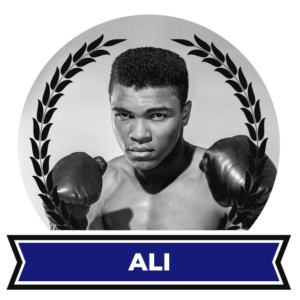 Ryan M 8 Ali: ‘We chose to name our house after Muhammad Ali because he was a very brave man who persevered and wasn’t afraid to show his beliefs,’
Ryan M 8 Ali: ‘We chose to name our house after Muhammad Ali because he was a very brave man who persevered and wasn’t afraid to show his beliefs,’
Muhammad Ali was one of the greatest boxers in history with an impressive 56-win record. He was also the first fighter to win the world heavyweight championship on three separate occasions.
Not only was Ali a boxing champion, winning “Sportsman of the Century” in 1999, but also a champion of people speaking out against injustice and racial inequality. Ali was also known for his social message in refusing induction into the U.S. Army during the Vietnam War; playing a large part in jumpstarting the 1960’s Anti-war Movement. Although the majority of Americans still supported the war at this time, Ali invoked his rights to decline service as a conscientious objector. Despite paying a heavy price for his decision, including being banned from boxing for three and a half years, he stood by what he believed in.
Armstrong: (1930 – 2012)
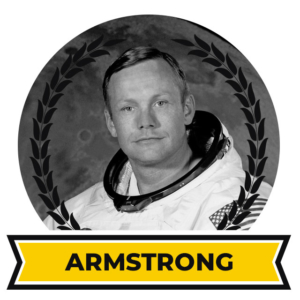 Harry H 8: ‘Neil Armstrong, as the first man on the moon, he demonstrated bravery in a totally unknown and new environment. He has many values and qualities that Armstrong house would also like to possess, which is why we named our house after him.
Harry H 8: ‘Neil Armstrong, as the first man on the moon, he demonstrated bravery in a totally unknown and new environment. He has many values and qualities that Armstrong house would also like to possess, which is why we named our house after him.
Neil Armstrong was an American Astronaut, military pilot and educator. As a Purdue University graduate in aeronautical engineering, he became a naval aviator in the U.S Navy and even saw action in the Korean War.
Armstrong then joined NASA Astronaut Corps and made his first spaceflight as command pilot of Gemini 8 in 1966, becoming NASA’s first civilian astronaut to fly in space. On the 20th July 1969, Armstrong made history as the first man to walk on the moon and was awarded the presidential medal of Freedom by President Richard Nixon.
As an engineer and outstanding pilot Armstrong executed the extremely dangerous job of landing on the moon. Despite all of the bumps in the road he executed the landing professionally and to an extremely high standard. As the first man to walk on the moon, Armstrong propelled the possibility of space travel for mankind forward massively.
Franklin: (1942 – 2018)
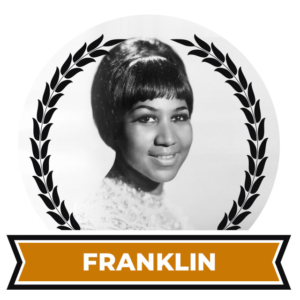 Jacob Townley 8: ‘We choose Aretha Franklin because not only was she an amazing artist, she was someone who persevered to overcome adversities with hard work, good character and by doing everything to the best of their ability. Who better to represent our house, encourage us to persevere and be the best we can be.,’
Jacob Townley 8: ‘We choose Aretha Franklin because not only was she an amazing artist, she was someone who persevered to overcome adversities with hard work, good character and by doing everything to the best of their ability. Who better to represent our house, encourage us to persevere and be the best we can be.,’
Aretha Franklin is the most charted female artist in history. She was an American singer, songwriter, pianist and civil rights activist. With a plethora of hit songs such as ‘Respect’ and ‘Freeway of Love’ Franklin became known as the Queen of Soul as well as receiving numerous honours and awards throughout her career.
Alongside her successful music career, Franklin became an integral part of the civil rights movement, using both her voice and her platform to advocate for racial equality. She has used the stage to stand up for challenged people, share her points of view as well as to encourage people to register to vote and stand up for decency.
Keller: (1880 – 1968)
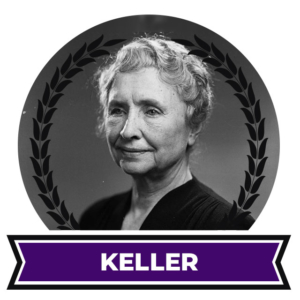 Michael S 8: ‘We Chose Helen Keller as our inspirational person because she pushed through hard times even when the odds were stacked against her, showing resilience, which is what we wanted to represent.’
Michael S 8: ‘We Chose Helen Keller as our inspirational person because she pushed through hard times even when the odds were stacked against her, showing resilience, which is what we wanted to represent.’
Hellen Keller was an American educator that overcame the adversity of being blind and deaf to become one of the 20th century’s leading humanitarians, as well as co-founder of the ACLU. She was the first deaf-blind person to earn a Bachelor of Arts degree.
Keller went on to become a world-famous speaker and author. She is remembered as an advocate for people with disabilities as well as tackling other social and political issues including women’s suffrage, pacifism, birth control and socialism. Within her life, she travelled the world to show that blind and deaf people can read and write just like everyone else they just learn a different way and so encourage improvements for job training, resources and better education.
Nightingale: (1820 – 1910)
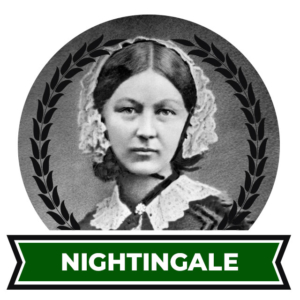 Freddie C 8: ‘ We chose Florence Nightingale because, like her, in our house, we believe in kindness and equality in how everybody is treated. We care for others and stay true to our values,’
Freddie C 8: ‘ We chose Florence Nightingale because, like her, in our house, we believe in kindness and equality in how everybody is treated. We care for others and stay true to our values,’
Florence Nightingale was a nurse and writer who came to prominence while serving as a manager and trainer of nurses in the Crimean war. She and a team of nurses improved the unsanitary conditions at a British base hospital, greatly reducing the death count. From this, she laid the foundation for professional nursing and became an icon of Victorian culture as “The Lady with the Lamp” because of making rounds of the wounded soldiers at night.
As a writer, much of her published work was concerned with spreading medical knowledge, written in simple English so they could be easily understood by people with poor reading skills. Her writings sparked worldwide health care reform, and in 1860 she established St. Thomas’ Hospital and the Nightingale Training School for Nurses.
Nightingale played a pivotal part in taking nursing from what was seen as a vocation to lower classes and turning it into a profession. She also revolutionised hospital conditions making them more organised and sanitary allowing patients worldwide to receive better care.
Tesla: (1856 – 1943)
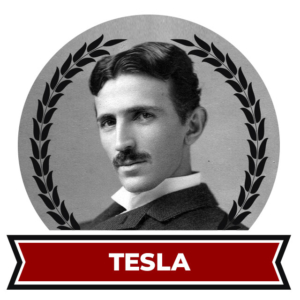 Jaydene G 8: ‘We chose Tesla as our house name last year because he played an important role in inventing electricity that we all use today making him an inspiration to many,’
Jaydene G 8: ‘We chose Tesla as our house name last year because he played an important role in inventing electricity that we all use today making him an inspiration to many,’
Nikola Tesla was an inventor, engineer and futurist who is best known for his invention of alternating-current (AC) electricity and the discovery of the rotating magnetic field. Tesla patented the Tesla coil, which laid the foundation for wireless technologies and built a wireless-controlled boat, one of the first-ever exhibited.
Tesla built the foundation of the power system that provides electricity to our homes and buildings even today. He also pioneered the field of radio communication and was granted more than 100 patents for his inventions.

